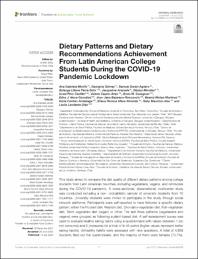Mostrar el registro sencillo del ítem
Dietary Patterns and Dietary Recommendations Achievement From Latin American College Students During the COVID-19 Pandemic Lockdown
| dc.contributor.author | Murillo, Ana Gabriela | es_ES |
| dc.contributor.author | Gómez, Georgina | es_ES |
| dc.contributor.author | Parra-Soto, Solange | es_ES |
| dc.contributor.author | Araneda, Jacqueline | es_ES |
| dc.contributor.author | Morales, Gladys | es_ES |
| dc.contributor.author | Ríos-Castillo, Israel | es_ES |
| dc.contributor.author | Carpio-Arias, Valeria | es_ES |
| dc.contributor.author | Cavagnari, Brian | es_ES |
| dc.contributor.author | Nava-Gonzalez, Edna J. | es_ES |
| dc.contributor.author | Bejarano-Roncancio, Jhon Jairo | es_ES |
| dc.contributor.author | Núñez-Martínez, Beatriz | es_ES |
| dc.contributor.author | Rosángel Cordón, Karla | es_ES |
| dc.contributor.author | Meza-Miranda, Eliana Romina | es_ES |
| dc.contributor.author | Mauricio, Saby | es_ES |
| dc.contributor.author | Landaeta-Díaz, Leslie | es_ES |
| dc.date.accessioned | 2022-11-23T15:16:17Z | |
| dc.date.available | 2022-11-23T15:16:17Z | |
| dc.date.issued | 2022-07-14 | |
| dc.identifier.uri | https://hdl.handle.net/20.500.13053/7207 | |
| dc.description.abstract | This study aimed to compare the diet quality of different dietary patterns among college students from Latin American countries, including vegetarians, vegans, and omnivores during the COVID-19 pandemic. A cross-sectional, observational, multicenter study was conducted including a non- probabilistic sample of university students from 10 countries. University students were invited to participate in the study through social network platforms. Participants were self-reported to have followed a specific dietary pattern; either the Prudent diet, Western diet, Ovo-dairy-vegetarian diet, Fish-vegetarian diet, Strict vegetarian diet (vegan) or other. The last three patterns (vegetarians and vegans) were grouped as following a plant-based diet. A self-assessment survey was used to evaluate healthy eating habits using a questionnaire with values between 1 (do not consume) and 5 (consume) for a total of 9–45 points (higher values represent better eating habits). Unhealthy habits were assessed with nine questions. A total of 4,809 students filled out the questionnaire, and the majority of them were females (73.7%). A high percentage have been in lockdown for more than 5 months and were in lockdown when the survey was released. 74.3% were self-reported to follow a prudent diet, while 11.4% reported following a western dietary pattern and 8.8% a plant-based diet. When compliance with healthy and unhealthy dietary habits was analyzed, although all groups had low compliance, the plant-based diet group (56.09 ± 6.11) performed better than the Western diet group (48.03 ± 5.99). The total diet quality score was significantly higher for plant-based diet followers, who also tended to better achieve the recommendations than omnivorous students, especially the ones following a western diet. These results present evidence that young adults such as college-aged students have unhealthy dietary habits. However, the ones who follow a plant-based diet such as vegetarians and vegans exhibit better scores and healthier dietary conducts. | es_ES |
| dc.format | application/pdf | es_ES |
| dc.language.iso | eng | es_ES |
| dc.publisher | Frontiers Media S.A. | es_ES |
| dc.rights | info:eu-repo/semantics/openAccess | es_ES |
| dc.rights.uri | https://creativecommons.org/licenses/by/4.0/ | es_ES |
| dc.subject | dietary patterns, vegetarians, vegans, omnivorous, COVID lockdown | es_ES |
| dc.title | Dietary Patterns and Dietary Recommendations Achievement From Latin American College Students During the COVID-19 Pandemic Lockdown | es_ES |
| dc.type | info:eu-repo/semantics/article | es_ES |
| dc.identifier.doi | https://doi.org/10.3389/fsufs.2022.836299 | es_ES |
| dc.type.version | info:eu-repo/semantics/publishedVersion | es_ES |
| dc.publisher.country | CH | es_ES |
| dc.subject.ocde | http://purl.org/pe-repo/ocde/ford#3.03.00 | es_ES |
Ficheros en el ítem
Este ítem aparece en la(s) siguiente(s) colección(es)
-
SCOPUS [380]


